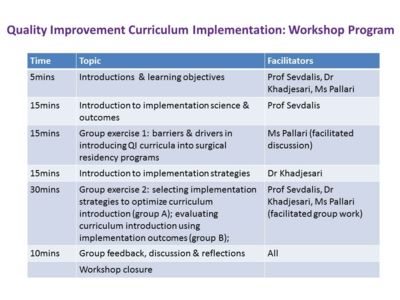WS42 - 05: DEVELOPING AND IMPLEMENTING QUALITY IMPROVEMENT SKILLS CURRICULA FOR SURGICAL RESIDENTS: A PRACTICAL, EVIDENCE-BASED APPROACH TO IMPLEMENTATION AND EVALUATION
Nick Sevdalis, PhD, Elena Pallari, MSc, Zarnie Khadjesari, James Green; King's College London
Background: Improving quality of surgical care is a global priority. Developing effective, evidence-based curricula that teach residents quality improvement (QI) skills can increase capability within surgery to effectively improve services. Whereas a number of curricula have been developed, successful implementation and effective and efficient evaluation of such curricula remain problematic.
Workshop aim: To introduce a basic framework informed by implementation science that allows optimizing the implementation of surgical QI curricula; and offers an evidence-based framework for evaluating quality of implementation longitudinally.
Workshop learning outcomes: By the end of this workshop, delegates should:
- Be familiar with basic principles of implementation science
- Be familiar with a set of evidence-based implementation outcomes to use for evaluating effectiveness of introduction of a QI curriculum into a residency
- Be aware of a range of implementation strategies applicable to QI curricula
- Have had the opportunity to reflect on barriers/drivers of introducing QI curricula
- Have had hands-on experience of applying implementation principles when introducing and evaluating QI curricula
Workshop content (Figure 1): The basic principles of implementation research will first be introduced, followed by a standardized set of implementation outcomes. These will be discussed as an established and practical approach to evaluate the implementation and uptake of a QI skills curriculum within a residency program. Outcomes that will be introduced include curriculum acceptability, adoption, appropriateness, feasibility, fidelity (quality of delivery), costs, reach and sustainability.
Barriers and drivers to successful implementation and maintenance of a QI curriculum will be explored through small-group work with the delegates.
Implementation strategies will be reviewed, based on state-of-the-art evidence and relevance to workshop delegates.
The workshop will then move onto a hands-on exercise. Workshop delegates will be presented with a draft QI curriculum, as an exemplar; they will be asked to plan the implementation of the curriculum and the ongoing evaluation of the implementation, such that a program director would know how well the curriculum is being applied and works for their faculty, educators and residents.
The workshop will conclude with delegates’ self-reflections.
Workshop delivery: A mixture of didactic teaching; hands-on exercises; and peer-to-peer learning.

